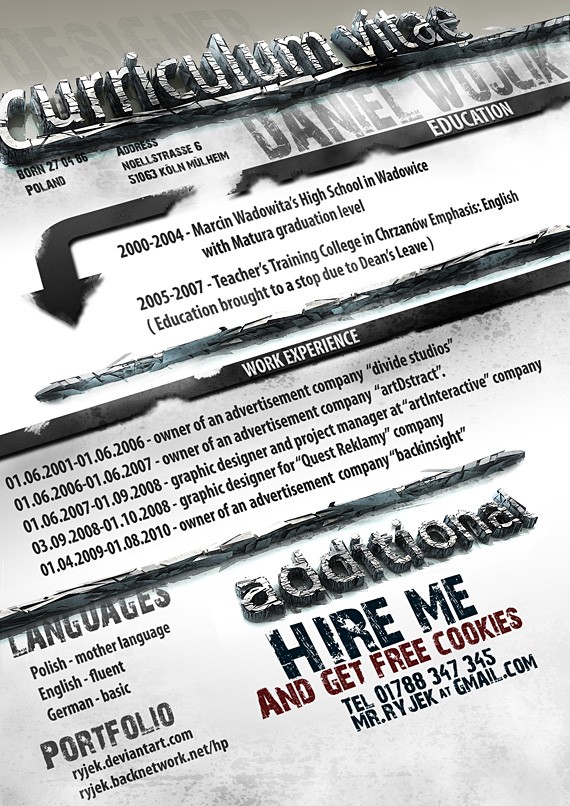1stwebdesigner |
| Things to Know if You Plan on Working Abroad Posted: 23 Mar 2011 03:00 AM PDT Searching for a job abroad is becoming more common every year. Many people go past the border of their own country to look for a life elsewhere. The reasons vary, it may be because of better financial prospects, it may be because of a better environment. Whichever the case – been there, done that. So if you are thinking about packing your bags and getting on a plane, you might want to consider what you can expect, so you’re ready and prepared, when the time comes to board that plane. As mentioned, I actually did go through a couple of countries in recent years and worked at various companies while doing it. I’ve learned a number of things while doing it, and hopefully some of the things I’ve learned will help you. Of course I’m presuming you are looking for a job somehow related to design/coding etc., not construction or such. Okay then, let’s try to create a list with various factors you’ll need to take into consideration. Let’s start with: Are you ready?Yeah, are you? That’s the most basic question you have to ask yourself. Strong will and good intentions will only get you so far. It’s not exactly a picnic out there, so be sure your plan is as bullet proof as possible. First point: Are you good?Look objectively at your own skills. Imagine you actually landed the job you’re aiming for and think about things that your boss might need of you. Are you capable of delivering all of them? Have some friends working already at a similar position? Ask them about their daily tasks and challenges, make sure you won’t get eaten alive out there. It’s going to be really tough if you suddenly realize you can’t do your own job when you’re already in another country. Be sure that your technical skills are at least decent. Truth be told, you are probably going to have to be considerably better than the natives you’re going against if you want to have a chance. Finally, there is the talent factor. It’s pretty common knowledge that a lack of talent can be made up with hard work, but if you ask me, the ability to work hard is a talent in itself. Either way, the real question here is – are you better than the average person? If you can’t objectively evaluate yourself, have someone who has knowledge in the area do it. So if by the end of the day you indeed figure out you’re skilled and ready, we can move on. Complex SkillsWe already talked about finding out if you’re capable of tackling the common, daily challenges in your field of work (whether current or future). You’ll have to take into consideration the various types of companies that may require different skill sets. It’s mostly related to the companies’ size. In smaller companies, your boss will more often than not expect you to be able to work with various programs and be able to pretty much do everything by yourself. Bigger companies understand the idea of specialization much better. Unfortunately, your chances of getting work in the former are usually much more probable than the latter. So you may want to gain some knowledge in related fields. For example, if you are a designer specializing in Photoshop, make sure you have some knowledge of programs like Illustrator or InDesign as well. If you’re a coder, you might want to make sure you are capable of understanding various coding languages. I’m very well aware that narrowing your field of work allows you to become much better in what you do, but the small companies just can’t afford to hire different people for everything. Not to mention, that knowing the limitations of other technologies and programs is essential to work well in a team. Is there a need for you?I, actually at one point, found myself living in Iceland just before the country almost went bankrupt. If other people tell you that the financial crisis was hard for them, tell them to look at people who worked in advertising. Suddenly the whole world (or at least most of it) found it necessary to spare money wherever they could. So the amount of money being spent on advertising dropped drastically and while this article is not supposed to be a history lesson, I am trying to make a point that your chances of finding work are very strongly tied to the amount of work out there. During my quests to find a job in various countries (about five times in the past four years) one thing stood out: the amount of positions for coders greatly outnumber the ones for designers. I would imagine that’s still the case. The reason is quite simple as well – it’s much easier to learn the basics of Photoshop then it is to learn the basics of coding. You can’t really make any kind of generalization here though. Different regions will have different needs and available workforce. Hence, if you have any particular place in mind, you might want to do some research regarding those in the area. School The title itself pretty much explains a lot, but let’s get through it anyway. Whether you can or cannot put a school degree connected to your field of work on your CV will have a varying impact (never a positive though) on your chances of landing a job. Why? Because it depends not only on the places you apply to but the countries in which you apply as well. I’m well aware we cannot make a complete generalization here and it’s not my intent by any means. In the same town you will find different company owners may care more or less about whether you have a degree. That being said, I have noticed that people in some countries tend to lean more in one direction. For example in Germany (in my experience) it really matters whether you have a degree or not, Danish folks are open to the subject, but would like to see one anyway. On the other hand, the people I spoke with in Netherlands seemed to care more about what you can actually do, I think I only heard a question regarding a degree once. Iceland and Poland seemed completely alien to the subject of a school degree. So yeah, don’t take those as a general rule, but I for one will definitely stand by the opinion that different cultures have different approaches to the same subjects. ExperienceGoes hand in hand with a school degree. Your really want to be able to show that you have experience. Even if it is freelancing – put it in, the fact that you don’t have someone breathing down your neck does not mean it’s not a genuine source of knowledge and experience. By the end of the day, searching for work is not about modesty. Put anything you can out there, your goal is to impress these people, you won’t do that with puppy eyes alone. If you’ve been looking at some job offers on the Internet, in the papers or anywhere else, you probably noticed by now that usually two things keep coming up – degree and experience. If you don’t have the first one you can actually manage to work your way around it, without experience though you’re in a world of trouble. So start getting some if you’re not already. As I mentioned, even freelancing will help you and it’s not an occupation you can get fired from or not get accepted to. Your Portfolio and CVI’m well aware there are lots of CV templates on the Internet which are perfectly fine and do their job decently. Make no mistake though, you are applying for a creative job, so a visually outstanding CV can help you get your foot in the door. At first I was walking around with a portfolio in one hand and a plain, clean CV in the other. Sometimes I managed to have a long talk with my potential employers, sometimes it didn’t even last a minute. Then I changed my CV to the following one: The outcome was that every single person I showed it to was at least initially interested, some of them even despite having no free positions. So my new CV made them grab the bait, then I replaced the CV in front of them with a printed out portfolio created with a similar approach. That’s pretty much my ultimate technique I’ve came up with after dozens of meetings. Feel free to copy me. What if you’re a coder though? In that case you probably don’t possess the necessary skills to make an unconventional CV. Others do though. It may be a good time to invest some money in yourself and hire someone to do it for you. After all, if you land a job because of it, it’s going to pay off. An unconventional CV though brings one particular issue with it. The style of it may not be that of your potential employer. There are two main distinctions. A clean design and a flashy one. From what you can see, I obviously went for the second. If I had to talk with people in expensive suits though, I took the “normal” one. Do some research on where you are going to as well. Actually you want to do that regardless of the fact if you have different versions of CV or not. Legal issuesSo we’re done with the preparations regarding getting yourself ready personally, the problems don’t end there though. Every country has different laws regarding work. If you’re a member of the European Union and seek employment in another country in the EU, then you will have it much easier. That’s not always the case though. Neither this article, nor the blog itself, is aimed at the legal issues of working abroad, but I can’t just skip the subject all together either. So I’ll just run some basic things by you, then you will probably want to gather some more knowledge from other sources. Getting your permits downMight not be as simple as you think. For example in Denmark I had to have a job contract to present to the local authorities before I could apply for a permit to stay in the country (that, or having a lot of money in the account to show). In Iceland getting everything you need literally comes down to a couple of visits in two or three places and within a week you have everything done. In Germany the main problems were just figuring out how to do everything in compliance with various rules which may be quite time consuming but less confusing, then in other places. As you see, the way of getting past the legalities may vary greatly so just remember to check the laws where you want to go. I’ve seen people deported or get into a world of financial troubles due to lack of knowledge regarding local laws. I can’t stress enough how important it is to get a work contract from your employer as soon as possible. Without it you might have a problem with even renting a place to stay. Your shortcomingsRight, so let’s try to get into the shoes of your potential employer and think why we would NOT hire you. In other words, why you are less attractive as a worker then a native version of you. The language barrierThe first and maybe the biggest barrier. If you don’t speak the local language you’re in trouble. On one hand you can claim, that if you find a place where everyone speaks English (presuming, that you speak it yourself) then you should be fine. While it’s true in a sense, it does not solve the whole problem. The amount of disadvantages is quite big and with a little thought you probably would be able to come up with more examples. The point has been made though I believe. How to tackle the issue then? The easiest way of course would be to learn the language, but often that will not be possible, especially if you’re checking out multiple countries. In that cases I would recommend that you just assure your employer about your willingness to learn the local language. Not much more you can do really. Cultural ReferencesEvery region has different approaches to the same issues (as shown before). We have many stereotypes about different nationalities, but that’s just scratching the surface. To really know all the cultural references in a country you have to spend some time in it. The problem here mainly concerns the designers, not so much the coders. You can claim that the existence of the issue is connected to the marketing goal of the company in question. Agencies which are creating advertisements for international viewing will of course rarely use references which are not well known. Those are usually bigger companies, if you manage to get into one of those right off the bat, consider yourself lucky (or just very good, possibly both). Personal BeliefsThat may be a factor more often than you think and definitely more often then people will actually admit it. You can’t really do anything about it, it’s pretty much all in the hands of fate here. No one will openly admit their prejudices so all you can do is sit there and look trust worthy. Again, if this even were to take place, chances are that it will happen in a small company. The people at the big ones usually have better stuff to do, then pull problems out of thin air. The hassleFinally, you might be sent through the door just because it would be to much of a problem for the employer to hire you. Just be aware, that it may be factor, so try to come through, as a self sufficient person capable of handling your own problems. Your advantagesAll right, so we’ve looked at why we would not want to employ you. Let’s turn the tables. Fresh approachThe same thing, that was your disadvantage is also your perk. Coming from a different place gives you a completely different perspective. That can be very helpful for both designers and coders. If your employer is open to improvement your input may just be the thing he’s looking for. Variety between employees improves the quality of ideas coming out of brainstorming sessions. Also having knowledge of various areas can be the difference between landing or losing a client. Having native representatives for foreign clientsIt’s a common practice, where a company in one country specializes in clients originating from a different country. If you’re lucky enough, it just may be your country. If your employer is working for clients from across the border it benefits him in many ways, if he can show he employs some people from their own home land. SkillDon’t forget though – your biggest advantage is you. The aforementioned advantages and shortcomings are but factors which can sway your fate one way or the other. The majority of the decision whether to employ you or not will be based on your capability. What we’re trying to do, is to improve your chances by pointing things out. Do not make them the main point of your approach, that one is about you. Where and how to look?So we’re all set. The last thing to do is to actually find the places to apply to. InternetSurprise, surprise. The Internet is, as always, your best friend. Figure out where you want to go and find out if there are any jobs there. Sounds simple enough, you can get there in a few ways though. One of them is using job hunting websites like http://www.stepstone.com/ . In pretty much every country you will find some kind of an Internet board with jobs for the region. A complex list would be a topic for a whole new article, possibly for a different blog as well. For now, I’ll trust that you’re capable of asking uncle google for some job sites in the country of your choice. That’s one way. Another, which I found even more effective, is actually using Google to look for advertising companies in a particular region. Not only do those often have sections on their websites for job seekers where you can find the address to send your documents, but you will sometimes see openings listed on their website as well. By applying through their website you show a bigger interest in the company. You might as well want to send the applications as soon, as you can. At one point in life I was more interested in moving to a new place then where this place would be. So I’ve sent multiple applications through various countries using exactly the system I just described. Some companies even if they have no place for you now, will keep your documents for future possibilities. A few weeks ago I got an email from a company in New Zealand offering me a position for which I applied 16 months before. So you might want to make your availability known soon, some positions have a long waiting period. Grab your PhoneIt’s actually easier for people to tell you “no” by an e-mail than by phone. So if you want to increase your chances, instead of sending e-mails to the companies you find on the Internet, you can actually call them. Even if they tell you to send your information by e-mail, you’re already more then just an e-mail address. There’s a voice behind you and you’re “that guy who called”. Take any advantage you can get. Try to get the name of the person you spoke to, so that when you do email your documents, you can mention that you spoke with so and so. Print out your stuff and knockIf it’s harder to tell you “no” by phone it’s even harder to do so in person. You might be worried here, that people will be annoyed if you just show up unannounced at their door asking for work. You can of course call first and ask for an appointment, but I can honestly say that I never got any kind of negative vibe from anyone I’ve visited unannounced. Once I even met the boss on his way to a meeting, but he still stopped for a minute to talk with me and look through my stuff (it happened in Maastricht, Netherlands – people there are generally very polite and friendly). Good luckThat’s pretty much that. The rest is in your hands. Good luck out there, the worst thing you can do is nothing. |
| You are subscribed to email updates from 1stwebdesigner - Graphic and Web Design Blog To stop receiving these emails, you may unsubscribe now. | Email delivery powered by Google |
| Google Inc., 20 West Kinzie, Chicago IL USA 60610 | |










Comments (0)
Post a Comment